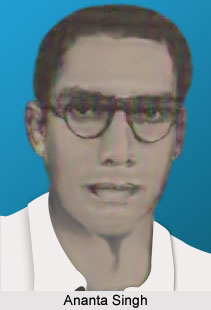 Ananta Singh, also known as Ananta Lal Singh, was one of the prominent Indian freedom fighters and a revolutionary as well. He was a member of the armed resistance movement that was led by Master- Da Surya Sen. He was amongst the foremost members of the Indian Republican Army that was a revolutionary group in Chittagong included various Indian revolutionaries and Indian freedom fighters who conducted and participated in the well known Chittagong Armoury Raid Case in the year 1930. Later, Ananta Singh founded a far-left radical communist group which was known as the Revolutionary Communist Council of India. It was a communist group located in Calcutta (now Kolkata) that existed during the early 1970s.
Ananta Singh, also known as Ananta Lal Singh, was one of the prominent Indian freedom fighters and a revolutionary as well. He was a member of the armed resistance movement that was led by Master- Da Surya Sen. He was amongst the foremost members of the Indian Republican Army that was a revolutionary group in Chittagong included various Indian revolutionaries and Indian freedom fighters who conducted and participated in the well known Chittagong Armoury Raid Case in the year 1930. Later, Ananta Singh founded a far-left radical communist group which was known as the Revolutionary Communist Council of India. It was a communist group located in Calcutta (now Kolkata) that existed during the early 1970s.
Early Life of Ananta Singh
Ananta Lal Singh was born to father Golap Singh on 1st December 1903 in Chittagong, which is currently a port city, as well as a commerce and industry hub in southeastern Bangladesh. His moved from Agra and settled in the region of Chittagong. Ananta Singh Master- Da Surya Sen while he was studying in the Chittagong Municipal School. Eventually he became a follower of Surya Sen and joined his revolutionary group.
Revolutionary Activities of Ananta Singh
Ananta Singh took active participation in the Non-cooperation movement in the year 1921 and with this his involvement in the Indian freedom struggle began. He inspired his friends in school to join the Indian freedom struggle but he himself did not have much faith in the revolutionary movement. On 14 December 1923, Nirmal Sen and Ananta Singh guided the robbery at the treasury office of the Assam Bengal Railway. This was carried out according to the plan devised by Master Da Surya Sen. After the robbery they clashed with the British Indian police on 24 December. He escaped from the area after the train robbery and went to Calcutta (now Kolkata), where he stayed at Sandwip for a short while. Singh was detained by the British Police in Calcutta but was soon released. He was later arrested again in the year 1924 and imprisoned for around 4 years.
After Ananta Singh was released from prison, he established a gymnasium and recruited several youths to become a member of the Indian Republican Army to participate in the revolutionary movement led by Surya Sen. Singh was one of the major participants in the Chittagong Armoury Raid Case, which was one of the most astounding and valiant revolutionary endeavors in the history of the Indian freedom struggle that was devised by the youths of the region. The attack was conducted on 18th April 1930 to raid the armoury of police and auxiliary forces from the Chittagong in Bengal province during the rule of the British Empire in India.
After the failure of the Chittagong raid, he escaped to Chandernagore (Chandannagar), which was still a French territory. But after knowing that his fellow revolutionaries were tortured in jail, he surrendered to the British police in Calcutta (now Kolkata) on 28 June 1930. After the trial, Ananta Singh was sentenced to transportation for life and moved to the Cellular Jail, Port Blair. In the year 1932, Ananta Lal Singh was brought back to a mainland jail, along with several of his fellow revolutionaries. This was done due to the efforts of Rabindranath Tagore and Mahatma Gandhi. After he was released from prison in the year 1946, Singh joined the Communist Party of India.
Literary Works of Ananta Singh
Ananta Singh composed a number of revolutionary literary works. His autobiography, Keu Bale Dakat, Keu Bale Biplabi, meaning Some Call Me a Robber, Some Call Me a Revolutionary, was perhaps his most popular and controversial work. His other noteworthy works include Ami Sei Meye (I am that Girl), Surya Sener Svapna O Sadhana (Dream and Austerities of Surya Sen), Agnigarbha Chattagram (Chittagong on Fire), Masterda on Surya Sen and Chattagram Yubabidroha (Youth Revolution in Chittagong), which was published in 2 volumes.
Later Life of Ananta Singh
After the country achieved independence from the British Government in the year 1947, Ananta Singh founded a new far left political group, named the Revolutionary Communist Council of India in Calcutta during the late 1960s. The members of the revolutionary group held several bank robberies in (now Kolkata) to raise funds for the purchase of arms and ammunitions. Later he was arrested along with the other members of the group from a forest near Jaduguda in modern day Jharkhand state in the year 1969. Ananta Singh was imprisoned until 1977. He was suffered from cardiac problems and later died on 25th January 1979.



















